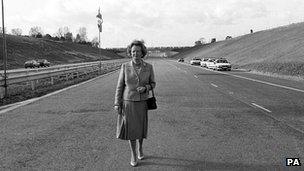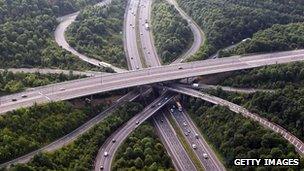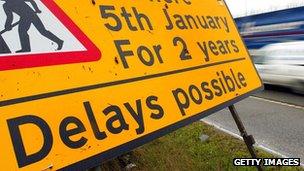M25: 10 ways it has changed lives
- Published
The M25 is celebrating its 25th birthday. The 117-mile (188km) road that orbits London has changed life in the UK in many ways, says Radio 2's traffic news announcer Sally Boazman. Here are some.
It took more than 11 years to build, cost £1bn and used more than two million tonnes of concrete and 3.5 million tonnes of asphalt. The M25 is a monster of a road in many ways.
The final section was opened by Prime Minister Margaret Thatcher in October 1986 to a huge fanfare. It has gone on to change many things, including our economy, environment and living habits. Here are just some:
1. Partying was changed forever for many young people. In the early 1990s the rave scene developed around the M25. Tens of thousands of young people would drive around it or gather at service stations, waiting for a phone call or someone to tell them which nearby field would be the location of that week's party. "All that needed to be known was that these raves would take place somewhere on the periphery of the M25. You basically set off in the direction of it," says DJ Judge Jules. The scene created headlines, spread across the country and resulted in changes to the law.

Margaret Thatcher opened the M25
2. Business spread from the capital in a way that wouldn't have been possible if it wasn't for the M25. Emma Goodford, a property consultant who specialises in the areas surrounding the M25, says that as a result of its presence a commercial market has developed outside central London. "I've seen it become a place where business really begins to happen. There's now in the M25 area 130 million square feet of space and that's the equivalent I suppose of 100 towers at Canary Wharf. And if you think the city of London in total is about 170 million square feet, this is a big, big catchment area in terms of employment."
3. Became a verbal reference when referring to London and the rest of the country. The phrases "inside the M25" and "outside the M25" are a common part of our language, both colloquially and officially. The Communications Act 2003 explicitly uses the M25 as the boundary.
4. Helped galvanise the anti-roads movement. Labelled by many as the "UK's biggest car park", the M25 got many questioning our relationship with the car. Soon after it opened traffic levels were exceeding maximum designed capacity. Several widening schemes have been announced over the years, sparking public inquiry after public inquiry. Some were carried out and others successfully challenged by protesters. "Its like digging a ditch in a bog, it always fills up," says Stephen Joseph, chief executive of the Campaign for Better Transport.

5. Increased house prices for many. Before the M25, areas just outside London were a mixture of small rural farms and commuter belt. But its arrival helped those commuters get on their way faster, pushing house prices in such areas higher. "We know from our research that house prices generally have gone up about 300% since the M25 opened in 1986," says Anthony Wardell from Knight Franks estate agents. On the western side of London, house prices have gone up nearer to 400%, he adds.
6. Built business empires. "They were talking about building this big orbital road and at that time I just thought it was another A road or a small motorway," says Ray Coleman of Lantern Recovery, a roadside recovery company. "We used to run probably at that time about 10 or 12 trucks. Once the M25 did open, I think on that particular day we did about seven jobs, from there on in it was an everyday occurrence. We operate now 220 trucks."
7. Got creative juices following. Novelist Iain Sinclair walked anti-clockwise around the motorway in 2000 for his book London Orbital. It also inspired the name of dance group Orbital, plus many of their songs.
8. Became a tourist destination. In its early days this great lump of tarmac held a strange allure for many. People came from all over the country to ride on it. Some even took coach excursions around it.

A familiar sight for M25 users
9. Changed the way people plan their lives, says M25 expert Chris Marshall. "You can get around London in ways that you couldn't do before and it doesn't just change the lives of people who lived around it before, or who worked around it before, you find that actually it changes the way that people plan their lives. So now not only does someone who lived in Harlow when it was opened have the opportunity to work somewhere else, but someone say who works say in Heathrow can buy a house on the other side of London."
10. A place of romance. In 1991 Chris and Sue Glazier held their wedding reception in a service station on the M25. The couple won a prize on a local radio station - a paid-for mystery wedding. "All we knew on the night before was that we'd been travelling at 50mph on our wedding night," says Sue. "We thought Orient Express perhaps, very romantic." They actually spent their wedding night on a coach going round the M25, although it did have a four-poster bed in it. How was the night? "Bumpy," says Sue.
- Published30 October 2011